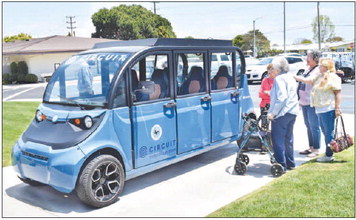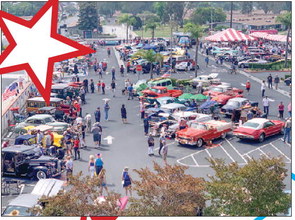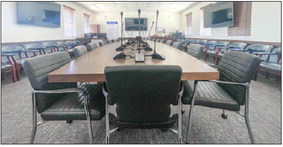Minibus replacement plan is tabled pending more information


GRF BOARD
by Ruth Osborn
communications director
The GRF Board met May 28 for its last meeting before new directors are voted in on June 4 and officially seated at the annual meeting on June 11.
In uncharacteristic form, the agenda included some big-ticket items. Usually, the final May meeting of the board term is devoted to administrative housecleaning and routine items. Typically, directors postpone momentous decisions until the new board is seated. But not this year. Spurred by the possibility of cost-savings in a year when assessments saw significant increases, a GRF task force fast-tracked a proposal to replace on-site Minibus transportation with an app-based service providing electric shuttles. The fast pace of the project proposal was driven by the findings of a GRF cost-savings task force led by GRF Director Carole Damoci from Mutual 12. Skyrocketing insurance costs and an ongoing decrease in ridership prompted the search for a less expensive alternative before the GRF begins fleet insurance negotiations in the late fall.
In the wake of the well-attended town hall May 24, Clubhouse 4 was again packed May 28 with residents mostly opposed to discontinuing Minibus service. Nineteen residents spoke during the public comment period. The majority expressed concerns about shuttle safety, the lack of community input, the out-sourcing of a longtime LW amenity and the loss of control that entails, and the potential challenges of using an appbased shuttle system.
After listening to residents, the board voted to table the item, with GRF President Marsha Gerber emphasizing that the board carefully weighs resident feedback in its decisions.
“The board really, really does listen to you,” Gerber told the crowd. “It’s important to me that you understand that. Do what you are doing, speak up and you are being heard.”
GRF Director Nick Massetti presented the motion to table: “It became clear from (the town hall May 24) that more needs to be done to present a more complete proposal to the Board, including receiving feedback from the insurance broker in regard to the Circuit proposal’s potential impact on premiums.”
The board also agreed to have an indepth discussion between the GRF bus drivers and Circuit Transit, study
Residents turned out at the May 28 GRF Board meeting to voice opinions on retiring the blue-and-white Minibuses in favor of a point-to-point system. the potential for Minibuses to offer point-to-point service and the costs to maintain it, and put a resident survey in the LW Weekly to gauge community opinion.
To see the meeting in its entirety, visit lwsb.com and click livestream. Other highlights are listed below. Internet Provider Migration
On the recommendation of the Operations Committee, the board voted to approve replacing FTS Broadband with Crown Castle and Starlink to provide internet services at the cost of $1,730 per month from operating funds and a one-time cost of $3,000 from capital funding.
FTS Broadband has been the sole internet provider for $1,300 a month but internet connections are unstable and have frequent outages that affect operations.
On average, there are eightplus hours of downtime every month. The GRF Information Technology Department recommended changing providers to increase speeds, and improve network stability and security.
Clubhouse 2 Flex Space
On the recommendation of the Operations Committee, the board voted to approve bare-bones renovation costs for the Clubhouse 2 Flex Space at $36,850, plus 10% contingency, with part of the project paid for from capital funding and the rest, from reserve funding.
The space under consideration once housed the now defunct woodshop and cannot be used in any public capacity until some renovations are made.
Once improved, the room could be used for club meetings and rented out for private events.
Improvements include remediating the popcorn ceiling, paint, and installing a heat pump, new flooring and lighting, and an automatic door opener. Window tints to cut down glare may also be added to the project.
Holiday Decorations
On the recommendation of the Member Services Committee, the board voted to award a contract to Magical Holiday Designs at a cost not to exceed $30,995 in operating funding. The motion narrowly passed with six no votes. Magical Holiday Designs stores and installs holiday decorations throughout the trust property. That includes lights on the rooflines, a Season’s Greetings sign and decorated trees.
Security Vehicle Replacement On the recommendation of the Facilities Committee, the board approved the purchase of three 2024 Elantra SELs from HB Hyundai at a cost not to exceed $78,000.
The reserve fund account holds $100,000 for vehicle replacement, which was scheduled for 2023.
Security officers patrol the community in four 2014 Chevrolet Impala Limited sedans, with odometer readings ranging from 97,590-155,444 miles, and engine-hour use times ranging from 12,165-19,728 hours. GRF Fleet Manager Grant Winford has estimated it would cost approximately $20,000 to repair the current patrol vehicles.
Amphitheater Heat Pump Replacement On the recommendation of the Facilities Committee, the board voted to award a contract to Greenwood Heating and Air to replace the climate control system at the Video Producers Room at the Amphitheater at a cost not to exceed $10,000, reserve funding.
The HVAC unit in the Video Producers Room at the Amphitheater is over 20 years old. It has failed and is beyond its useful life.
Replacement of Entry Canopy in CH 2 On the recommendation of the Facilities Committee, the board awarded a contract to AAA Awnings to replace a torn, 20-year-old canopy at the entrance of Clubhouse 2 at cost not to exceed $3,100. Replacement of Card Tables
On the recommendation of the Members Services Committee, the board voted to replace nine unstable card tables for a total cost not to exceed $940.
RV Rules Change
On the recommendation of the Operations Committee, the board voted to amend GRF Policy 48-1937-1, Parking—Rules, pending a 28-day notification period. The major changes are that recreational vehicles can be parked on trust streets for no more than 48 hours, down from 72 hours, in one location and must display a two-day pass.Recreational vehicles may be parked for up to 48 hours for loading and unloading. Once the vehicle is unloaded, it needs to be moved to the RV lot or the temporary RV parking area near Clubhouse 4. If space is unavailable, the RVs must leave the community.
The rule change is to preclude RVs from being parked for long periods in front of people’s homes or regularly moving them from place to place.





